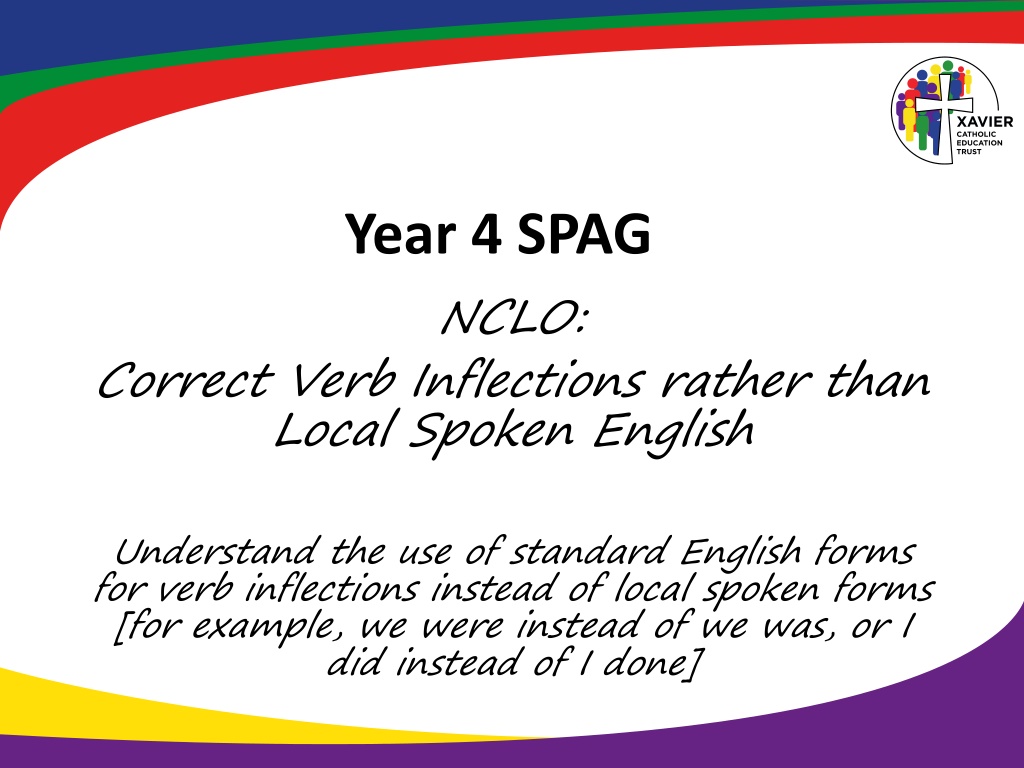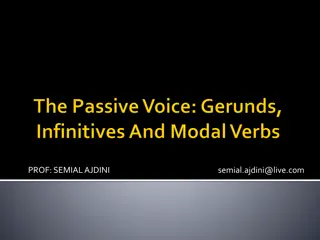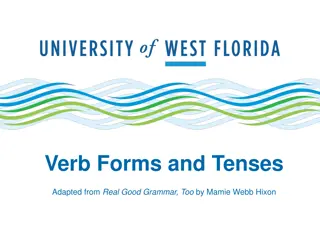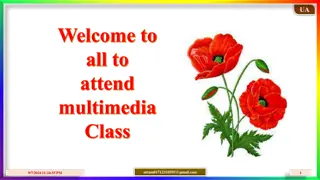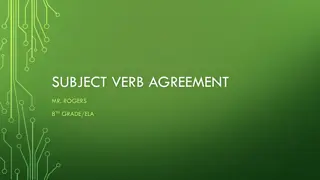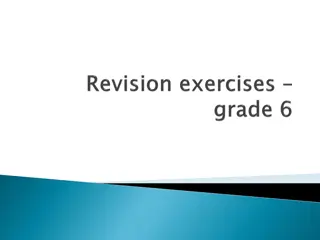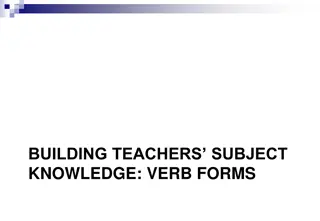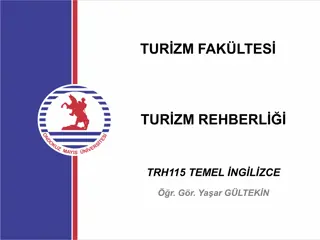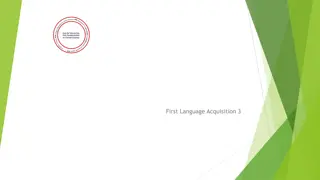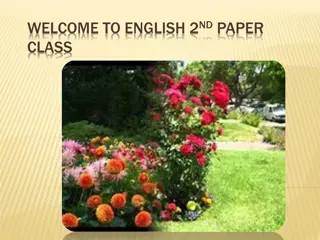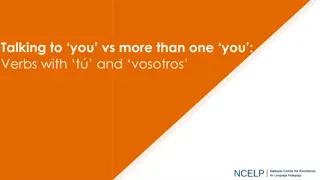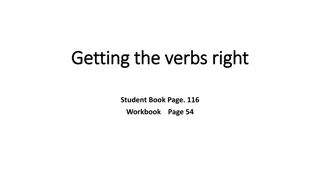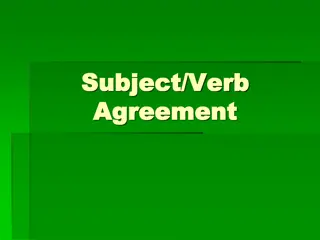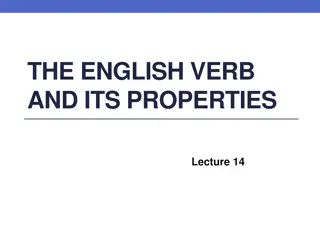Understanding Verb Inflections in Standard English
Verbs are essential in language as doing words, representing actions and states of being. Verb inflections involve changes in form based on tense, number, and person. Standard English ensures clear communication by using correct verb forms. Practice identifying correct verb inflections for "to be" to enhance language accuracy.
Download Presentation

Please find below an Image/Link to download the presentation.
The content on the website is provided AS IS for your information and personal use only. It may not be sold, licensed, or shared on other websites without obtaining consent from the author. Download presentation by click this link. If you encounter any issues during the download, it is possible that the publisher has removed the file from their server.
E N D
Presentation Transcript
Year 4 SPAG NCLO: Correct Verb Inflections rather than Local Spoken English Understand the use of standard English forms for verb inflections instead of local spoken forms [for example, we were instead of we was, or I did instead of I done]
What are verbs? Verbs are often referred to as doing words. For example: They are running. He is jumping. Andrew is sitting. I am eating. Verbs also include words which convey states of being and states of mind. For example: I am We were She feels
What are verb inflections? Verbs change their form according to how they are used within a sentence. This process is called inflection. Verb inflections are linked to tense, number and person. Below are examples showing various inflections of the verb walk: He walked, She is walking, They walk, He walks Often verb inflections just involve changing the verb ending and adding a suffix but sometimes the entire word changes dependent on whether the verb is irregular or not. For example: She ran , He is running, She runs She ate, He eats, She is eating, He has eaten
What is meant by standard English? Standard English is the form of English which is most widely understood in the United Kingdom. People from different parts of the country speak with varying accents and dialects. At times, people use vocabulary and grammar unique to where they come from. This can be confusing and lead to people from different places not understanding each other. When standard English is used, it makes it easy for everyone to understand each other despite regional differences. Standard English is usually used in writing even though when we speak we may say things differently.
Inflections of the verb to be using standard English Past Simple I was You were He/She/It was We were They were Present Simple I am You are He/She/It is We are They are
Have a go! Sometimes people use the incorrect inflections of the verb to be when speaking in non-standard English. It is important that we understand the correct form of the verb to be and use it appropriately in our writing. Can you identify the sentences which show the correct inflections of the verb to be ? 1.The girl was playing with her toys. 2.The children was in the classroom. 3.It were hot today. 4.This cake is delicious. 5.The cats was hungry. 6.You was happy with your present.
Were you right? Sentences 1 and 4 show the correct use of the verb to be . Sentences 2,3,5,6 are incorrect 1.The girl was playing with her toys. 2.The children was in the classroom. (were) 3.It were hot today. (was) 4.This cake is delicious. 5.The cats was hungry. (were) 6.You was happy with your present. (were)
Inflections of the verb to do using standard English Past Simple I did You did He/she/It did We did They did Other inflections of to do include doing and done combined with auxiliary verbs to create various past and present forms. For example: I have done the washing up (present perfect). Present Simple I do You do He/she/It does We do They do
Have a go! Sometimes people use the incorrect inflections of the verb to do when speaking in non-standard English. It is important that we understand the correct form of the verb to do and use it appropriately in our writing. Can you identify the sentences which show incorrect inflections of the verb to do ? 1.We done our homework. 2.The children did not want to go outside. 3.I ve done my shopping. 4.He does not like carrots. 5.Emma is doing her sewing. 6.Arik and Aleena done their best in the math s test.
Were you right? Sentences 1 and 6 show the incorrect use of the verb to do . 1.We done our homework. 2.The children did not want to go outside. 3.I ve done my shopping. 4.He does not like carrots. 5.Emma is doing her sewing. 6.Arik and Aleena done their best in the math s test. Note: We use did not done to express simple past tense. Done can be used to show other past tense forms but must be combined with an auxiliary verb. For example. They had done brilliantly (past perfect).
Informal verb inflections Ain t and gonna are commonly used in speech to replace verbs; however, they are not real words. They can be regarded as slang and are more associated with speech than writing. These words are usually not appropriate when writing or in formal situations. Ain t Gonna is sometimes used when speaking in non- standard English gonna Gonna Ain t is sometimes used when speaking in non- standard English. In standard English ain t should be replaced by either: is not, am not or have not. For example: I ain t happy (non- standard). I am not happy (standard). standard English. In should be replaced by going to. For example: I m just gonna get my coat. I m just going to get my coat.
Can you help Simon improve his job application letter by using standard English for verb inflections? Dear Mr Hargreaves, I am writing because I seen your job advert for an ICT expert . I am gonna tell you why I would be the ideal person to work in your office. I ain t worked in an office before, but at school I were always top of the class in computing. I done brilliantly in all of my ICT exams and assessments. I ain t got any doubt that you will be impressed by my ICT skills. I am the perfect person for this post. I hope to hear from you soon. Yours sincerely, Simon Smith
Did you spot where improvements were needed? Dear Mr Hargreaves, I am writing because I seen saw your job advertisement for an ICT expert. I am gonna going to tell you why I would be the ideal person to work in your office. I ain t have not worked in an office before, but at school I were was always top of the class in computing. I done did brilliantly in all of my ICT exams and assessments. I ain t have not got any doubt that you will be impressed by my ICT skills. I am the perfect person for this post. I hope to hear from you soon. Yours sincerely, Simon Smith
Reflect and Discuss Explain what these terms mean: Standard English Non-standard English Verb inflection Which is more formal: standard or non-standard English? Which is more appropriate when writing: standard or non-standard English?
